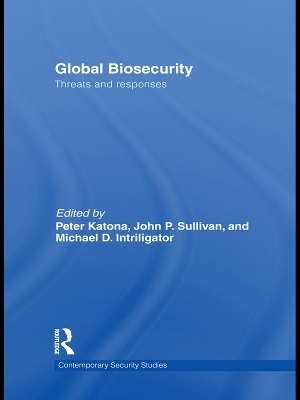
Global Biosecurity
Routledge (Verlag)
978-0-415-67059-3 (ISBN)
Specifically covering bioterrorism, emerging infectious diseases, pandemic disease preparedness and remediation, agroterroism, food safety, and environmental issues, the contributors demonstrate that to counter terrorism of any kind, a global, networked, and multidisciplinary approach is essential. To be successful in biosecurity, this book argues it is necessary to extend partnerships, cooperation, and co-ordination between public health, clinical medicine, private business, law enforcement and other agencies locally, nationally and internationally. Internationally, a clear understanding is needed of what has happened in past epidemics and what was accomplished in past bioprograms (in Britain, South Africa, Russia, for example). This book also assesses how, with the right technology and motivation, both a state and a non-state actor could initiate an extremely credible biothreat to security at both local and national levels.
This book will be of much interest to students, researchers and practitioners of security studies, public health, public policy and IR in general.
Peter Katona is Associate Professor of Clinical Medicine at the David Geffen School of Medicine at UCLA in Infectious Diseases. He is co-founder of Biological Threat Mitigation, a bioterror consulting firm.
John P. Sullivan is a lieutenant with the Los Angeles Sheriff’s Department. He is also a researcher focusing on terrorism, conflict disaster, intelligence studies, and urban operations. He is co-founder of the Los Angeles Terrorism Early Warning (TEW) Group.
Michael D. Intriligator is Professor of Economics at the University of California, Los Angeles (UCLA). He is also Professor of Political Science, Professor of Public Policy in the School of Public Policy and Social Research, and Co-Director of the Jacob Marschak Interdisciplinary Colloquium on Mathematics in the Behavioral Sciences, all at UCLA.
Peter Katona is Associate Professor of Clinical Medicine at the David Geffen School of Medicine at UCLA in Infectious Diseases. He is co-founder of Biological Threat Mitigation, a bioterror consulting firm. John P. Sullivan is a lieutenant with the Los Angeles Sheriff’s Department. He is also a researcher focusing on terrorism, conflict disaster, intelligence studies, and urban operations. He is co-founder of the Los Angeles Terrorism Early Warning (TEW) Group. Michael D. Intriligator is Professor of Economics at the University of California, Los Angeles (UCLA). He is also Professor of Political Science, Professor of Public Policy in the School of Public Policy and Social Research, and Co-Director of the Jacob Marschak Interdisciplinary Colloquium on Mathematics in the Behavioral Sciences, all at UCLA.
Preface. Reflections of an Old Bioweaponeer William Patrick III. Introduction: Global Biosecurity and the Spectrum of Infectious Disease Threats Peter Katona, John P. Sullivan and Michael D. Intriligator Part 1: Assessing the Threats of Natural and Deliberate Epidemics 1. Emerging and Re-emerging Infectious Diseases Peter Katona and W. Michael Scheld 2. Biological Warfare and Bioterrorism: How Do They Differ from Other WMD Threats Philip Coyle 3. A History of Bioterrorism and Biocrimes Peter Katona and Seth Carus 4. Food and Agricultural Biosecurity Tom Frazier 5. The Economic, Political, and Social Impacts of Bioterrorism Michael D. Intriligator 6. Technology and the Global Proliferation of Dual-Use Biotechnologies Mark Gorwitz 7. Conflict and Environmental Security Setting the Stage for Humanitarian Crises John P. Sullivan Part 2: Gaps and Weaknesses in Current Public Health Preparedness and Response Systems 8. Problems in Coordinating Health, Law Enforcement and Intelligence Activities in the U.S. and Europe Stefan Brem and Stéphane Dubois 9. Emerging Roles of Reserve Forces: National Guard Role and Mission in Domestic Preparedness Annette L. Sobel 10. Mitigating Crisis Through Communication Dan Rutz Part 3: Integrated Approaches to Infectious-Disease Preparedness and Response 11a. Bioterrorism Surveillance Manfred Green 11b. The Role of Informal Information Sources as an Adjunct to Routine Disease Surveillance Majorie Pollack 12. A Public Health Model for WMD Threat Assessment: Connecting the Bioterrorism Dots on the Local Level Dickson Diamond and Moon Kim 13. Integrating Local, State, and Federal Responses to Infectious Threat Jonathan E. Fielding, Elan Shultz, Noel Bazini-Barakat, Deborah Davenport, Jon Freedman, Robert Mosby and Robert Ragland 14. Vulnerable Populations in Disaster Planning: Children are Different Jeffrey S. Upperman 15. Developing a New Paradigm for Biodefense in the 21st Century: Adapting our Healthcare Response to the Biodisaster Threat Joseph Rosen and C. Everett Koop 16. Biosecurity Neil Jacobstein 17. Towards a Global Ius Pestilentiae: The Functions of Law in Global Biosecurity David P. Fidler Conclusion: An Integrated, Networked Approach to Infectious Disease Preparedness Peter Katona, John P. Sullivan and Michael D. Intriligator Epilogue: Reflections on the Future of Bioweapons Alvin Toffler
| Reihe/Serie | Contemporary Security Studies |
|---|---|
| Verlagsort | London |
| Sprache | englisch |
| Maße | 156 x 234 mm |
| Gewicht | 630 g |
| Themenwelt | Studium ► Querschnittsbereiche ► Epidemiologie / Med. Biometrie |
| Naturwissenschaften ► Geowissenschaften ► Geografie / Kartografie | |
| Sozialwissenschaften ► Politik / Verwaltung ► Europäische / Internationale Politik | |
| ISBN-10 | 0-415-67059-4 / 0415670594 |
| ISBN-13 | 978-0-415-67059-3 / 9780415670593 |
| Zustand | Neuware |
| Informationen gemäß Produktsicherheitsverordnung (GPSR) | |
| Haben Sie eine Frage zum Produkt? |
aus dem Bereich


